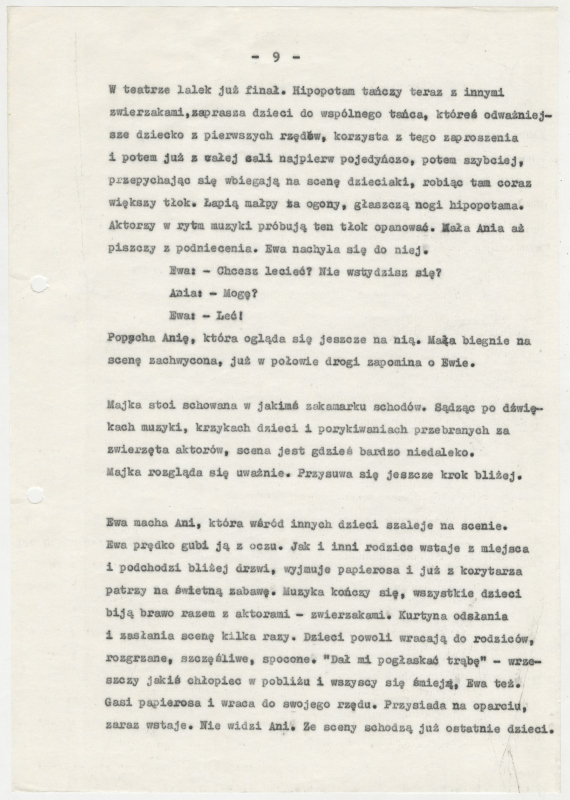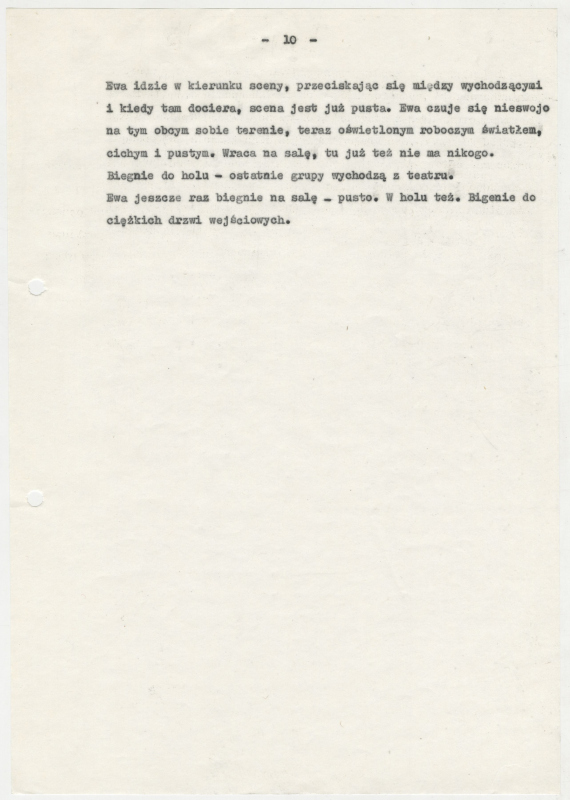Lalka Theater at the Palace of Culture and Science
Lalka Theater was founded in 1945 in Uzbekistan, where it operated as the Niebieskie Migdały Theater in Samarkand, before moving to Krakow in 1946 and later, in 1948, to Warsaw. Its home since 1955 has been the Palace of Culture and Science. The theater was established by the art historian and illustrator Janina Kilian-Stanisławska, who was active in the avant-garde art scene in Lwów (now Lviv) before the Second World War.
Decalogue Seven
The scene in which we see six-year-old Ania (Katarzyna Piwowarczyk) watch a children’s puppet show is characterized by a near documentary-like veracity. The audience of children view an actual play: Maria Kownacka’s The Tale of the Terrible Dragon, staged by the Lalka Theater in Warsaw. The spontaneous reactions of the girl and the other children echo a similar scene in Kieślowski’s later film, The Double Life of Veronique. In a scene that takes place at a puppet show in a school in France, we see a group of children equally enraptured by a performance put on by an actor with two hand puppets. Certain themes in Kieślowski’s work cross over from one film to the next, and the director uses them to evoke in us the same rapt absorption we witness in the children watching the play in Decalogue Seven. This scene also provides viewers with an interpretational hint of sorts: the image of Ania running around the stage amid the puppets can be read as a commentary on the child’s tragic existential circumstances, in which she is like a puppet whose fortunes are wholly dependent on the whims of adults. This theatrical theme brings to mind a significant detail from the director’s youth. Kieślowki developed an early passion for the theater, and attended a high school with a special drama program before enrolling in film school. His dream at the time was to become a theater director. Kieślowski’s first medium-length film, Personnel (1975), is the story of a young tailor who makes costumes for the opera.
Mikołaj Jazdon
The Seventh Commandment:
You shall not steal.
“The Judgment of Solomon”
Kieślowski tests the sacred right of property, which the seventh commandment seems to protect, using the most sacred of all examples: the “ownership” of a child. The case is as common as it is realistic: a teenager gets pregnant, and her mother steps in to provide help and support. An ostensibly noble and constructive solution, at the outset, but somewhere in the plan lurks a fatal flaw… Is it theft? Possessiveness? No solution could be found in the biblical “judgment of Solomon,” a test of motherhood that relies on a simple axiom: a mother, almost by definition, will value the good of a child over custody thereof. But what if the true mother is psychopathically “unfit,” and the “impostor” turns out to be a good-hearted one? Adhering to the criteria of the test, Solomon wouldn’t discover the identify the true mother, but he would still place the child in better hands. O sagacious Solomon! But Kieślowski digs deeper: Ania’s biological mother Majka, and Majka’s own biological mother—Ania’s actual guardian—have different (possessive?) views of what’s best for the girl. It seems that as Majka enters adulthood, she mostly matures to the thought of losing “possession” of her daughter. But she also loses her own mother, who “steals” her granddaughter Ania and makes her “her own” daughter, thereby compensating the inconsolable loss of her own daughter Majka (“daddy’s girl”). Kieślowski, like Solomon before him, shows us that possession must never come before good. A true mother “shall not steal” a child for herself. The director’s depiction of the commandment to respect the property of others emphasizes the need for altruism and the good of our neighbors; “If someone takes your cloak, do not stop him from taking your tunic,” the Gospel tells us.

